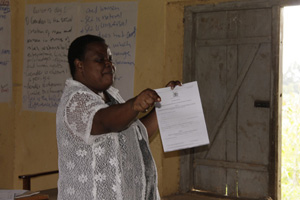The Gulu university intra-university
debate competitions kicked off in high gear on 23rd February with a
mock debate between the different faculties. The mock debate was preceded by a
debate training session in which students were introduced to concepts of
gender, good governance and the British parliamentary debate system. The four
sessions aimed to equip the young men and women with deeper understanding of
gender equality and good governance, while providing them with a forum in which
to discuss their understanding of the concepts amongst their peers with
eloquent, cohesive arguments.
 |
| Students exchanging views during the mock debate |
As a result of the
sessions, the students were inspired to think outside the box concerning gender,
with a number of critical questions being raised in that regard. Interest was particularly piqued in regard to
the extent of the effects of a patriarchal society on gender equality, with
some questioning the agenda of the women's movement in eroding some protective
mechanisms that are enshrined in a patriarchal system allegedly to protect
women. For instance, exclusion from direct armed combat.
According to one
student, the discussion was an eye opener for her. She sad, "It's up to us
to take the responsibility to recognize that because society has been
conducting things one way, it doesn't have to be the same forever, it is up to us
to accept it and change ourselves before we can be able to inspire other people
in the communities to change."
Challenged to go
head-to-head in a mock debate, students from eight departments formed four
opposing teams to argue the motion: "This house would abolish the woman
seat in parliament." The rich debate widened the students' scope of
understanding in regard to gender, and boosted their confidence for the final
qualifier competitions to be held on 24th February. The four winning
teams will represent Gulu University at the 2013 ACFODE Inter University Debates.
For more updates on
the Gulu intra university debates, as well as a pictorial of the on-going
events, click here.
You can also follow
the debate proceedings on our website at: www.acfode.org
Compiled
by:
Nancy
Nandudu
Public
Relations and Communications Officer
Action
For Development (ACFODE)

